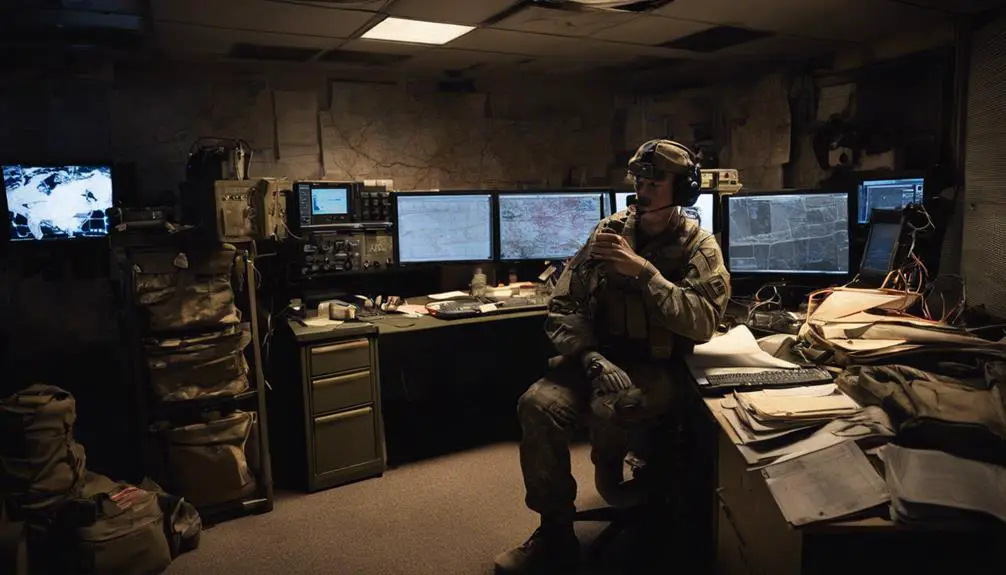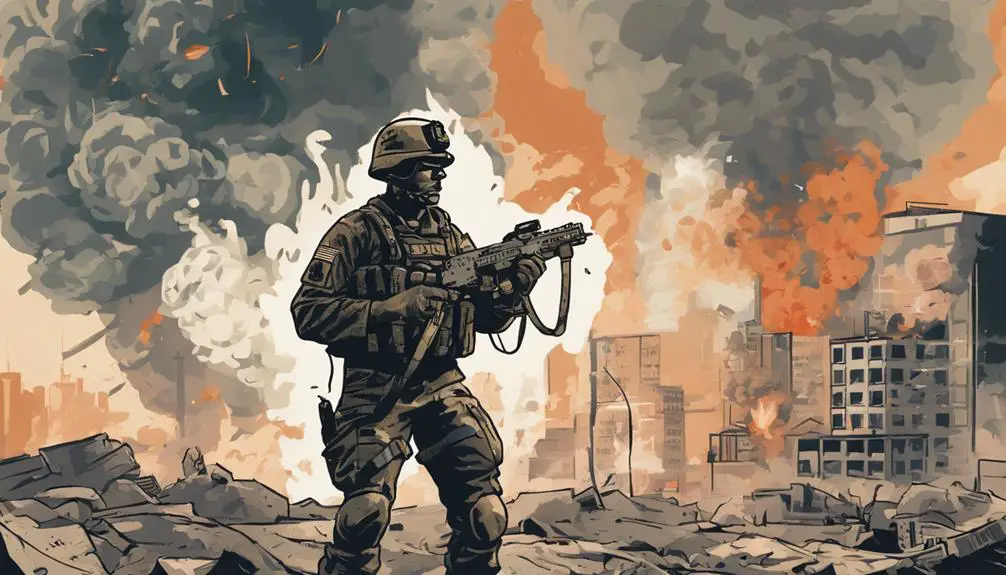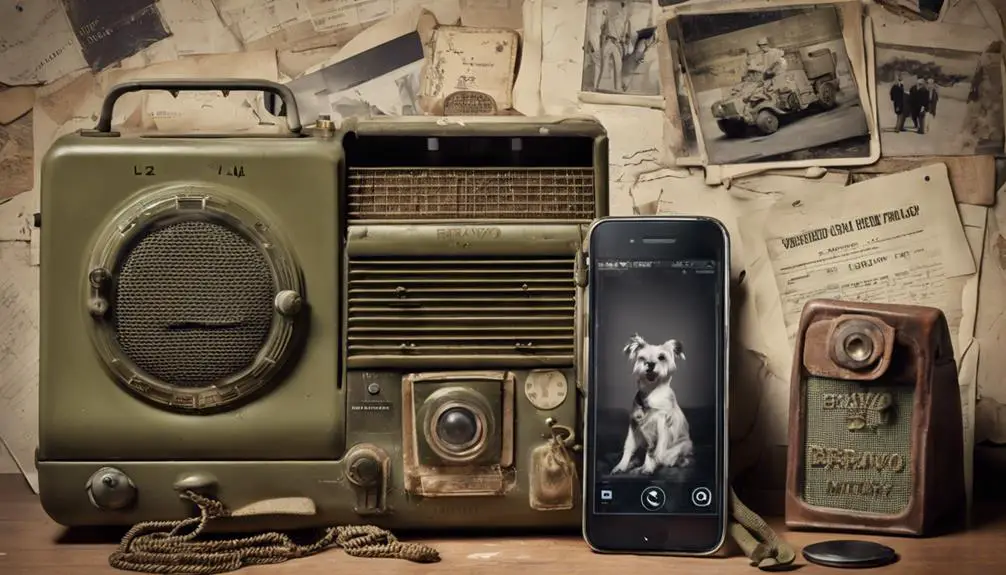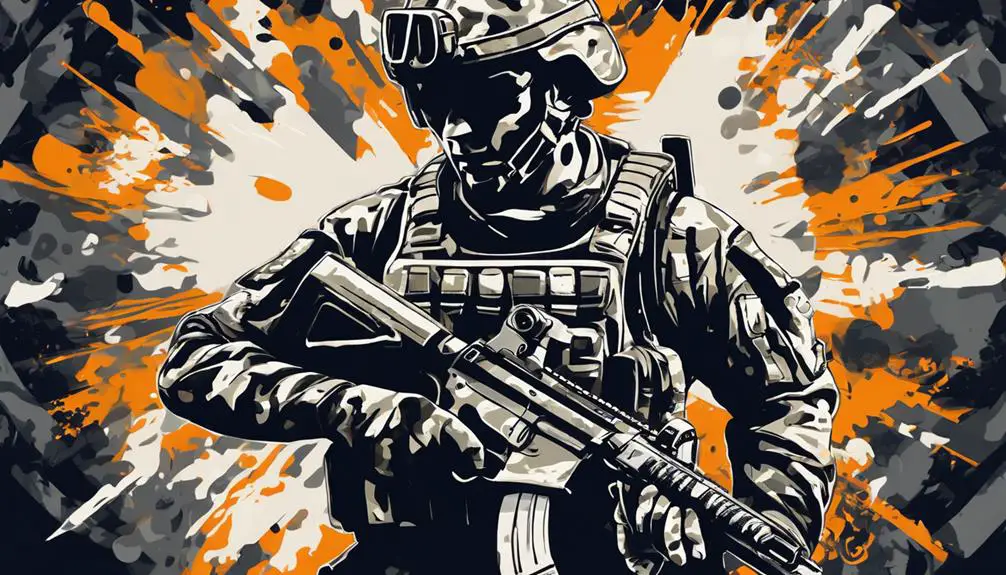When you hear 'Bravo' in military communication, it's not just the letter 'B' – it's a code that guarantees accurate transmission of critical information in high-stress situations. You'll often hear it in radio protocols, where clear communication is essential. The phonetic alphabet system, adopted in 1927, aims to convey information clearly in noisy environments. Misinterpreting 'Bravo' can lead to critical mistakes, so understanding it is vital. From 'Bravo Zulu' to 'Bravo Lima Charlie', mastering Bravo basics is key to effective communication. As you explore further, you'll uncover the evolution and significance of Bravo Military Slang.
Deciphering Bravo in Radio Comms

When you're listening to radio communications, deciphering 'Bravo' can be an important skill, as it's often used to clarify critical information in high-stress situations. In radio protocol, 'Bravo' is used to represent the letter 'B', and understanding its significance is essential to avoid communication breakdown. Misinterpreting or misunderstanding 'Bravo' can lead to critical mistakes, putting lives at risk.
In high-pressure situations, clear communication is crucial, and 'Bravo' plays a significant role in ensuring that. It's used to verify information, clarify instructions, and confirm receipt of critical messages. For instance, if a team leader says 'Bravo-1-2', you know they're referring to the letter 'B', followed by the numbers 1 and 2. This clarity is important in avoiding confusion and ensuring seamless communication.
In radio communications, every second counts, and 'Bravo' is an essential tool in maintaining clarity and precision. By understanding 'Bravo's' significance, you can make sure that critical information is conveyed accurately, reducing the risk of communication breakdown and potential disasters.
Origins of Bravo Military Slang
You're likely wondering how 'Bravo' became an integral part of military slang, and the answer lies in the phonetic alphabet system developed during World War I. This system, also known as the International Radiotelephony Spelling Alphabet, was created to clearly communicate letters and words over radio and phone communications, particularly in noisy environments.
| Letter | Phonetic Equivalent |
|---|---|
| B | Bravo |
| A | Alpha |
| C | Charlie |
| D | Delta |
Early adoptions of this system were seen in the military, where clear communication was essential. The Historical Roots of this system date back to the early 20th century, with the International Telecommunication Union (ITU) adopting it in 1927. Over time, the phonetic alphabet became an essential tool for military communication, and 'Bravo' became an integral part of military slang. As you explore the world of military slang, understanding the origins of 'Bravo' will give you a deeper appreciation for its significance in military communication.
Bravo Codes in Combat Zones

In the heat of combat, you rely on clear and concise communication to stay alive, and that's where Bravo codes come into play. These codes are essential in combat situations, where seconds count, and miscommunication can be deadly. Bravo codes are standardized phrases used to convey critical information quickly and accurately, ensuring that you and your team are on the same page.
One common misconception about Bravo codes is that they're only used for secrecy or encryption. However, their primary purpose is to facilitate clear communication in high-stress situations. By using Bravo codes, you can convey complex information in a concise manner, reducing the risk of misunderstandings.
In combat zones, every second counts, and Bravo codes help you stay focused on the mission at hand. By using these codes, you can quickly communicate crucial information, such as enemy positions, casualties, or mission updates, without wasting precious time.
Common Bravo Phrases Explained
From 'Bravo Uniform' to 'Bravo Zulu', understanding common Bravo phrases is vital to effective communication in combat zones, where every second counts. As you navigate the world of Bravo Military Slang, you'll encounter a range of phrases that are essential to mastering Bravo Basics.
You'll hear 'Bravo Zulu', which means 'well done' or 'good job', and 'Bravo Uniform', which stands for 'burn uniform' or 'destroy uniform'. These phrases might seem obscure, but they're part of the everyday applications of Bravo Military Slang.
In combat zones, clear communication is a matter of life and death. That's why understanding Bravo phrases like 'Bravo Lima Charlie' (meaning 'Loud and Clear') or 'Bravo Mike' (meaning 'Mike' or 'M' in the phonetic alphabet) is vital.
You'll also come across 'Bravo Niner', which represents the number '9' in the phonetic alphabet. Mastering these phrases is key to effective communication in high-pressure situations. By grasping Bravo Basics, you'll be better equipped to navigate the world of Bravo Military Slang and stay focused on the mission at hand.
Evolution of Bravo Military Lingo

Throughout history, military slang has adapted to the needs of its users, and Bravo Military Lingo is no exception. You might be surprised to learn that this unique dialect has evolved significantly over time, reflecting the cultural importance and historical context in which it was used.
In the early days, Bravo Military Lingo was heavily influenced by the cultural norms and values of the time. For instance, during World War II, soldiers used slang to boost morale and create a sense of camaraderie. Phrases like 'gung ho' and 'foxhole' became synonymous with the era.
As social norms and cultural values shifted, so did the language. In the 1960s and 70s, Bravo Military Lingo took on a more countercultural tone, reflecting the anti-war movement and the rise of youth culture. Today, Bravo Military Lingo continues to evolve, incorporating elements of modern technology and social media.
You'll hear phrases like 'embed' and 'info op' tossed around, reflecting the changing nature of modern warfare. Despite these changes, one thing remains constant: Bravo Military Lingo remains a powerful tool for building community and conveying complex ideas quickly.
Frequently Asked Questions
Is Bravo Military Slang Used by All Branches of the Military?
You're wondering if all branches of the military use the same slang. The answer is no, they don't. Each branch has its own unique culture and lingo, resulting in Branch Variations.
While there might be some overlap, Inter Service communication can be tricky due to these differences. For instance, what's common in the Army mightn't be familiar to the Navy or Air Force.
Can Civilians Learn and Use Bravo Military Slang?
You might be curious about adopting a new lingo, but before diving into Bravo military slang, consider the implications.
As a civilian, you'll need to navigate cultural appropriation concerns and potential language barriers.
While it's possible to learn, using military slang without context or understanding its origins might come across as inauthentic.
Approach with respect and awareness, and be prepared to earn the right to use this specialized language.
Are There Regional Differences in Bravo Military Slang Usage?
You might wonder if regional differences shape the way people communicate. The answer is yes. Geographic variations and cultural influences can have a substantial impact on language usage.
When you look at the way people express themselves across different regions, you'll notice distinct patterns. This is especially true for idioms, colloquialisms, and slang.
Now, applying this to Bravo Military Slang, you'll likely find regional differences in usage, reflecting local cultural nuances and geographic characteristics.
Is Bravo Military Slang Used in Non-Combat Situations?
You're wondering if military slang is limited to combat zones.
Think of it like this: imagine a veteran, Joe, hanging out with friends at a BBQ. He casually mentions 'situational awareness' while grilling burgers, using tactical lingo in a relaxed, social setting.
In everyday chatter, military nuances can seep into casual ops, even in non-combat situations, reflecting the relaxed vibes and social codes of those who've served.
Can Bravo Military Slang Be Used in Formal Military Communications?
When communicating in formal military settings, you should maintain an official tone. While informal slang might be acceptable in casual conversations, it's generally not suitable for formal military communications.
However, there may be formal exceptions where using Bravo military slang is acceptable, such as in tactical operations or specific mission briefings. In these cases, using Bravo slang can enhance clarity and efficiency.
Otherwise, adhere to standard protocol language to guarantee clear and respectful communication.
Conclusion
You've cracked the code of Bravo military slang, and now you're fluent in a language that's as clear as a bell on a sunny day. Like a seasoned operator, you can navigate radio comms with ease, deciphering Bravo codes and phrases with precision.
As you've seen, Bravo military lingo has evolved over time, adapting to the needs of those on the front lines. With this newfound understanding, you're ready to communicate like a pro, making every second count in high-stakes situations.







